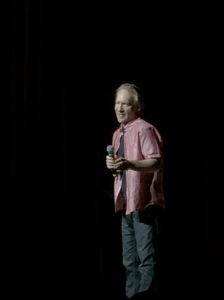 It was a weekend of iconoclasts in Indiana as I spent the past two days in the Hoosier state with Johnny Depp, Lily Tomlin, and Bill Maher.
It was a weekend of iconoclasts in Indiana as I spent the past two days in the Hoosier state with Johnny Depp, Lily Tomlin, and Bill Maher.
Well, I actually spent the past two days with my equally free-thinking parents who defy geographic boundaries, and we all took in movies and a show that featured these three performers.
 Namely, Black Mass, Grandma, and An Evening with Bill Maher.
Namely, Black Mass, Grandma, and An Evening with Bill Maher.
Bill Maher, explaining how he got into some controversy in a debate last fall with Ben Affleck (of all people), noted that he “just doesn’t like stupid things.”
 And in his worldview, that idea encompasses any government or faith or group of self-important, judgmental blowhards who want to diminish the rights and freedoms of others, particularly those who chronically find themselves on the short end of every stick.
And in his worldview, that idea encompasses any government or faith or group of self-important, judgmental blowhards who want to diminish the rights and freedoms of others, particularly those who chronically find themselves on the short end of every stick.
Fair enough. In fact, this notion of raging against stupid things defined all of this weekend’s entertainment.
Our first rule breaker of the weekend was Black Mass‘ Johnny Depp, so immersed in the look and feel of notorious Boston gangster Whitey Bulger, one might suspect he forgot to pay much mind to character development along the way. You know Johnny – he loves those colored contacts, that pancake makeup, and disarmingly fake-ass teeth. At least in this film, we didn’t have to suffer through any zany chapeaus.
Regardless, it is an impressive if uneven performance in an impressive if uneven film. Bulger, not unlike cinematic forebear Hannibal Lecter, definitely doesn’t like stupid. The film, directed with a more-or-less sure hand by Scott Cooper, marries the gruesome and the sparkling in surprising and inventive ways, and Bulger, at least in Depp’s portrayal, exacts a delightfully cracked code of punishing the moronic. Early in the film, Depp as Bulger tells a meddling police officer, “Do you think I’d warn you when I’m going to hurt you? No, you won’t see it coming.” Throughout the film, anyone who breaches Bulger’s plainspoken code, right and wrong, inevitably finds themselves two or three scenes down the road on the wrong end of a gun or more likely bare-fisted death blows.
Black Mass details the rise and fall and disappearance of real-life Boston “Southie” gangster James “Whitey” Bulger. Alas, familiarity breeds contempt, and we’ve seen too many fictionalized versions of this and similar stories over the past decade: The Departed, The Town … heck, American Hustle. While Depp gives the role his all, it’s just not quite enough to take the film to fresh levels. He may have had too much reverence for the character (or for his prosthetics), and Bulger sometimes seems like a ghost in his own film.However, Benedict Cumberbatch turns in some of his best work as Bulger’s starched straight-arrow politico brother, a successful senator from Boston. Benedict must have seen Depp’s cosmetic indulgence and headed 180 degrees in the other direction. Smart move. Cumberbatch resists the urge to play any predictable notes of sturm und drang. Cumberbatch gives us the consummate politician – likable, gracious, but with the kind of studied ethical ambivalence that makes looking the other way seem like moral high ground.
Joel Edgerton, as the brothers’ childhood friend, also does a fine job in a pivotal role as an FBI agent who may fancy himself the long arm of the law but, in the end, enjoys frequenting Miami discotheques with mobster buddies a bit too much. The point/counterpoint of the film comes from the devil’s gambit Edgerton plays, cutting a deal with Whitey to provide what ultimately proves to be specious intel to the FBI regarding his fellow crooks. By the time anyone realizes, the die is cast and decades have passed wherein Whitey Bulger builds an empire with his FBI buddy indeterminately complicit in the act.
Other standouts include Dakota Johnson, Julianne Nicholson, Corey Stoll, Rory Cochrane, David Harbour, Jesse Plemons, Peter Sarsgaard, Juno Temple, and W. Earl Brown. In fact, that is a big part of the film’s problem – too many characters, all well cast, but with not nearly enough time to develop fully. It is a testament to the performances and to the director that they stand out as they do.
As visceral and immersive as the film is, it just isn’t quite the gut punch I’d hoped. The narrative gets lost in a thicket of Scorsese-light subplots focusing on Bulger’s many “business ventures” (hailai! vending machines! sending weapons to the Irish Republican Army!), when what we most needed to see and explore were the serpentine interpersonal relationships of the two brothers, their family and their friends.
Giving us a much richer portrayal of an original gangster is Lily Tomlin in Chris Weitz’ charming ball of familial toxins Grandma. Tomlin plays a writer and academic whose longtime partner recently died, whose daughter has stopped speaking to her, and whose granddaughter turns to her in a moment of crisis. The film takes the form of an inter-generational road trip (which we’ve seen too many times before – and as recently as, say, Tammy or The Guilt Trip), but in this case sharp writing, smart feminist sub (and super) text, and flesh and blood authenticity transform cliché into revelation.
There will be a host of boneheads out there who will stubbornly refuse to see this film because Tomlin’s granddaughter has turned to her grandmother to help her pay for an abortion. Damn, I’m tired of knee-jerk closed-mindedness. Honestly, it’s not a film about abortion. It’s a film about humanity – those of us living in the here and now, faced with darkly comic daily tragedies that only the mundane can bring.We have become a country of squawkers who so viciously judge everyone else’s choices in the abstract that we’ve completely forgotten the real people behind those choices, people struggling to get lives back on track or to fulfill their deepest potential. You know what? The path any of us take to get there is no one’s damn business. This film celebrates that notion, warts and all.
The film suffers from some clunky transitions, endemic of the low-budget indie, but, on the whole, Tomlin and the film really zing, heightened by the deft help of a supporting cast that includes … genius, heartfelt Marcia Gay Harden as Tomlin’s loopy, jagged little pill of a careerist daughter; Judy Greer earnest and raw as Tomlin’s frustrated girlfriend; Julie Garner, a saucy millennial dandelion as Tomlin’s suffering, sputtering, spiraling granddaughter; firecrackers Laverne Cox and Elizabeth Pena (in her last role) as a couple of Tomlin’s cronies; and Sam Elliott as an open wound of an ex-husband, all swagger, self-righteousness, and melancholy.
But ultimately this is Tomlin’s show. This film is the perfect synthesis of the platform she has championed for decades: we are all outsiders on this planet, and no one more so than women. Why define and limit opportunity based on rudimentary biological constructs? Why is every choice women make questioned and challenged, and emotional, financial, clinical, occupational resources are funneled away in those moments when they are most needed, out of some kind of institutionalized patriarchal spite.
A quiet storm of misanthropic joy, Tomlin wages a postmodern Sherman’s March, across Los Angeles, in pursuit of the meager dollars needed to fund her granddaughter’s procedure. She suffers no fools gladly – from a standoff with John Cho in a pretentious coffee shop that displaced a women’s clinic (you haven’t lived until you see Tomlin write “f*ckhead” in spilled coffee on a snooty barista’s floor) to a heart-wrenching (and crazy funny) defense of her granddaughter when they finally arrive at the actual clinic where the procedure will be performed. I don’t want to spoil the surprise, but what a pro-life little princess does to express her “love of humanity” (with Tomlin on the receiving end) is as telling as it is hysterical.
Tomlin’s character is a broken heart in bullet-proof armor, fed up with a society that undervalues humanity, especially anyone who lives on the margins, pigeonholed by age, gender, sexuality, or, hell, hairstyle.
Bill Maher, may walk a similar path through life, at least as evidenced by his stand-up routine. As the host of Politically Incorrect and Real Time, Maher has always wielded snark like a machete, cutting down rigid, conservative political idiocy at every turn. Whereas a Jon Stewart or a Stephen Colbert are a bit more equal opportunity, taking as many digs at Democrats as Republicans, Maher saves most of his ire for Republicans, championing any underdog he sees persecuted by increasingly shrill right-wing pundits and blowhards.
 Much like Tomlin’s Grandma, Maher’s routine Saturday night at the Fort Wayne Embassy took no prisoners. With an impish and childlike glee, Maher swung for the fences, excoriating the pompous asses currently running for president. I’ll let you figure out who his chief targets were. One hint: all of them.
Much like Tomlin’s Grandma, Maher’s routine Saturday night at the Fort Wayne Embassy took no prisoners. With an impish and childlike glee, Maher swung for the fences, excoriating the pompous asses currently running for president. I’ll let you figure out who his chief targets were. One hint: all of them.
I had, perhaps unfairly, found Maher a bit misogynistic in the past. I love that he comes to the aid of all creatures great and small – he is a longtime board member for PETA. However when it came to women, it has often felt like he left his conscience and consciousness in some back hallway of the Playboy Mansion.
Saturday night’s show went a long way toward correcting that perception, as 90 to 95% of his routine actively subverted conventional concepts of gender and sexuality. He nailed a bit on how different cultures define and imprison women via the sartorial choices dictated by fashion or religion.
However, in the show’s final minutes, Maher took a strange left turn that seemed to be an ill-advised concession to menopausal chauvinists – which is too bad cause there weren’t any that I could spy in the beautifully diverse sold out crowd. He went down a strange path of wondering when “his group” – apparently men who date women half their age – would be “celebrated,” going on to re-enact Cialis and Viagra advertisements. It was as unconvincing as it was odd and overreaching – “Look at me! I may be a liberal, but I’m a baby boomer man, and I dig the ladiiiiieeesss.” Whatever. I’m not buyin’ what you’re sellin’, Maher.
 I will admit that embedded in his concluding riff was a keen observation that a certain group of men are still driven entirely by preoccupation with their nether regions and not with their brains. Yet, unlike any other era, they have access to a medical industry and clinical research to make their pubescent dream$ reality.
I will admit that embedded in his concluding riff was a keen observation that a certain group of men are still driven entirely by preoccupation with their nether regions and not with their brains. Yet, unlike any other era, they have access to a medical industry and clinical research to make their pubescent dream$ reality.
However, it was, to say the least, murky, as to whether Maher saw himself with pride as part of the crumbling Casanova club or as their court jester. It was a strange note of ambivalence to end an otherwise scorchingly consistent evening of social insight and tolerance.
To watch any comedian for two hours is a bit of a marathon. It’s a lot to ask of them, and it’s a lot to ask of the audience, but Maher rose to the occasion, and, with the assistance of a handy notebook full of laminated pages, he kept the momentum coursing through a wide array of topics, chiefly political though not exclusively.
We were also offered brief glimmers of what his upbringing was like in a Catholic home raised by two liberals who always championed the poor and the downtrodden. He didn’t open his veins for the audience – he’s anything but a memoirist. Yey, by showing us a peek into what sounded like an idyllic and inclusive home, he revealed that underneath whatever emotional Kevlar he has strapped on, there is a sweet and wounded heart beating inside.
His relentless barbs take on a different tone in that context. The marginalized kid is Maher, and this is his ultimate revenge fantasy on all the dopes who bullied him in life. It’s like Death Wish with jokes as his weapons and idiot politicians as his prey.
Maher opened with some well-deserved digs at Indiana in 2015, much to the delight of the capacity crowd. About Hoosier leaders like Governor Mike Pence, Maher crowed, “Why, they don’t have the book learning to get into a tractor pull!” To be among thousands of like-minded liberals from across Northeast Indiana (I mean, I’ve never seen the Embassy so packed) was a revelation for my parents who often feel isolated and sad for holding such progressive beliefs in the community – a place that seems to buy (and spread) the thick, sticky, divisive, fear-mongering balm Fox and Friends slops across the land every A.M.
Maher’s words electrified a big room of open brains, thirsting for a different kind of dialogue, one where we could talk, laugh, commiserate, re: the significance of global warming or to deride and dismiss hypocritical ravings of multiple-married conservatives who fail to see how their behavior undermines their beloved institution of wedded bliss.
Sitting in that huge performance space of the Embassy, encrusted as it is in gilt and cherubs and velvet – an artifact of another time; being part of a crowd of raving regular folks who happened to dig tolerance and laughter; having been informed by two films the night before that questioned how we see ourselves and how we measure the success of a life fulfilled, I thought, “Hey, am I at a kind of big tent revival? Evangelism for the Anti-Elmer Gantry age? Well, sign me up for another round.”
____________________________
Reel Roy Reviews is now TWO books! You can purchase your copies by clicking here (print and digital)In addition to online ordering at Amazon or from the publisher Open Books, the first book is currently is being carried by Bookbound, Common Language Bookstore, and Crazy Wisdom Bookstore and Tea Room in Ann Arbor, Michigan and by Green Brain Comics in Dearborn, Michigan. My mom Susie Duncan Sexton’s Secrets of an Old Typewriter series is also available on Amazon and at Bookbound and Common Language.











